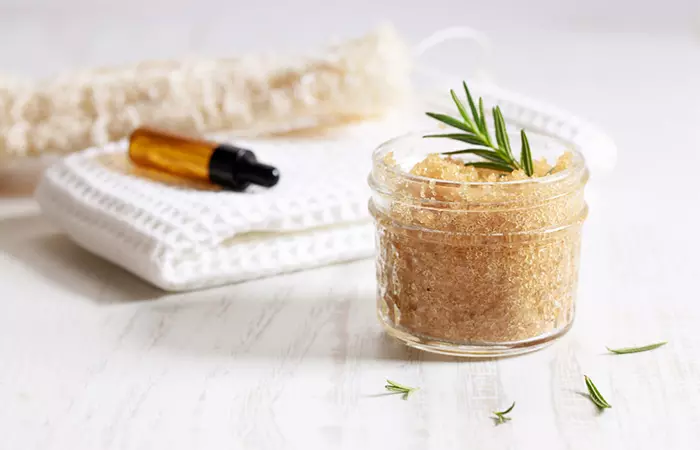This article will discuss the causes of hyperpigmentation on the buttocks, along with certain skin treatments, home remedies, and preventive tips. Keep reading. It is extremely important to understand what’s causing your hyperpigmentation. The most common causes are listed in the next section!
What Causes Skin Discoloration On The Buttocks?
1. Excessive Sun Exposure
Sun exposure causes melanin formation in the body. Melanin protects skin from damaging rays by acting as a natural sunscreen, which is why people tan in the sun. Excessive sun exposure, on the other hand, might interrupt this process, resulting in hyperpigmentation.
2. Tight Clothing
Tight clothing is one of the most prevalent causes of hyperpigmentation. This is because our buttocks are constantly in contact with tight underwear and pants. The continuous friction on the skin by tight clothing plays a large role in discoloration in that area.
3. Poor Hygiene
Clean your buttocks thoroughly whenever you take a shower. This is because the accumulation of dirt, dead skin, and grease results in hyperpigmentation.
4. Prolonged Sitting
Sitting for a long period of time can be the cause of both bad blood circulation and friction on the buttocks, which can result in discoloration.
5. Lack Of Blood Circulation
The absence of oxygenated blood causes your skin to undergo visible color changes. In addition, poor circulation makes it harder to regenerate new skin cells, making your skin appear darker.
6. Product Irritation
The application of certain products may lead to irritation and the overproduction of melanin to protect your skin from infection. This phenomenon leads to hyperpigmentation on the buttocks. The appearance of discoloration on the buttocks may make you feel insecure. However, it can be treated with a variety of methods. Keep reading to know more!
Treatments For Hyperpigmentation On The Buttocks
Hyperpigmentation of the buttocks does not always require treatment as it may fade away with time. However, if the discoloration persists, there are a variety of treatments available. Board-certified plastic surgeon Dr. Michael K. Newman says, “Treatment for hyperpigmentation is only required in rare cases. Darker skin is frequent in the buttocks and other public places. Dark patches created by cleared folliculitis or other underlying reasons that are no longer present generally go away on their own over time. Darker spots vanish after six to twelve months. However, it might take years for deep-seated or even deeper discoloration to disappear on its own.” “People who wish to attempt to balance out pigmentation for aesthetic reasons have options,” he adds. He suggests looking for one of the following components in over-the-counter skin-lightening products:
Azelaic acidi An organic acid found in grains like barley, rye, and wheat that is used to treat skin issues like acne and inflammation. Glycolic acidi A water-soluble alpha hydroxy acid (plant- and animal-derived acid) derived from sugar cane that is used in skin care products. Kojic acidi A chemical compound made from different fungi with melanin-blocking properties that is used to lighten skin and treat hyperpigmentation. –Retinoidi A chemical compound derived from vitamin A with anti-aging properties that is used in skin care products to treat acne and fine lines. (retinol, tretinoin, adapalene gel, or tazarotene)
You may also look for topical creams that contain ingredients like niacinamide, hydroquinone, or licorice extract to improve the appearance of the skin. A study indicated that combining topical retinol with other chemical peels may drastically improve hyperpigmentation appearance. The study had 1614 participants segregated by race, white (1191) and black (262), and ethnicity, Hispanic (352) and non-Hispanic (1262) . Reviewers noted that black participants had more cases of hyperpigmentation while the other groups had more cases of erythema. A decrease in hyperpigmentation percentage was seen in all groups by using tazarotene 0.045% lotion from baseline to week 12: Black, 40.5 to 31.3%; Hispanic, 17.8 to 11.2%.
Vitamin C
Other clinical treatments that you can try out include:
Chemical Peels: It helps deteriorate pigment and brown spots for an even skin tone. PICO Genesis: It is an advanced laser treatment that uses gentle heating to help fade unwanted skin pigmentation. Intense Pulsed Light Therapy: It is a highly accurate treatment option to correct the skin tone on various areas of the skin for a clearer look. Microneedling: This procedure involves puncturing the skin with needles to trigger its natural healing process. This boosts collagen and elastin as a consequence, and may help one achieve younger, brighter skin.
Home Remedies For Hyperpigmentation On Buttocks
Note: Remember to conduct a patch test before going for any of these home remedies.
1. Cleansing The Area Regularly
Cleansing your buttocks daily may help reduce hyperpigmentation. Use a gentle cleanser and dry the area thoroughly to see visible results. Also, exfoliate and use a cleanser with very mild salicylic acid to eliminate dead skin and open pores. This could assist in making your hyperpigmentation less noticeable.
2. Sugar Scrub
Since sugar is abrasive, it works as a natural exfoliating ingredient that helps clear clogged pores. To make the scrub, mix some sugar with coconut, olive, almond, or jojoba oil to preserve the moisture in your skin. What You Need
One cup of white/brown granulated sugar 3 tablespoons of any skin-friendly oil
How To Use
3. Lemon, Turmeric, And Yogurt
Anecdotal evidence suggests that lemon juice draws impurities out of pores and lightens the skin. This home remedy for skin pigmentation is also effective in reducing fine lines and wrinkles on the buttocks. However, it can also dry out your skin and cause inflammation. Apply some lemon juice to a tiny patch of skin to see how it reacts. Turmeric and yogurt are also similarly claimed to lighten the skin, but there is not enough scientific evidence to prove the same. What You Need
1 tablespoon of lemon juice ½ teaspoon of turmeric powder 1 tablespoon of yogurt
How To Use
4. Apple Cider Vinegar
Many people use apple cider vinegar to lighten pigmentation on the skin. It contains acetic acid that is said to function as a mild chemical peel. According to a study, apple cider vinegar contains polyphenolsi Naturally occurring compounds and micronutrients present in plant-based foods that are rich in antioxidants. that may help to protect skin cells (1). However, there is little evidence to support apple cider vinegar’s usage for treating hyperpigmentation. What You Need
1 cup apple cider vinegar 1 cup water
How To Use Caution: Stop using apple cider vinegar if you experience irritation or inflammation.
5. Oatmeal Yogurt and Honey
Oatmeal provides many benefits to the skin. It removes dead skin cells while also cleansing the skin when used as a scrub. Oatmeal has anti-inflammatory and antioxidant properties that can treat dark spots, patches, and scars. It also protects the skin against ultraviolet rays (2). Therefore, it may be of some help in reducing the hyperpigmentation on your behind. What You Need
1 tablespoon of oats 1 tablespoon of honey 1 tablespoon of yogurt
How To Use
6. Rose Water, Lemon Juice, And Honey
The vitamin C in lemon is a powerful antioxidant and may help treat hyperpigmentation (3). Honey acts as a soothing humectant and emollient and ensures moisture balance (4). You may use rose water for hyperpigmentation as roses are antioxidant and anti-inflammatory ingredients and may help even out pigmented skin tone (5). The combination of all these ingredients can also work as a good home remedy for dark inner thighs. What You Need
¼ cup of rose water 1 tablespoon of lemon juice 1-2 teaspoons of honey
How To Use Why treat hyperpigmentation when you can prevent it? Follow the steps mentioned in the next section to prevent hyperpigmentation on the buttocks.
How To Prevent Hyperpigmentation On The Buttocks
Wear loose-fitting clothes and avoid fabric softeners. Shower right after your workout to wash away sweat and bacteria. Exfoliate your skin regularly. Ensure your skin is moisturized. Maintain a balanced diet. Stay hydrated. Avoid shaving. Shaving damages the skin and causes scarring and darkening of the skin. Avoid hair removal lotions. They contain chemicals that can damage sensitive skin. When cleansing the buttocks and the area between the thighs, use an unscented, non-acidic, mild soap. Avoid comedogenici The tendency of ingredients used in cosmetics and skin care products to clog skin pores and cause blackheads and acne. lotions and body creams. Use sunscreen with SPF 30 or more to prevent exposed skin from darkening.
In most cases, hyperpigmentation can be treated with home remedies and proper skin care. But, sometimes, you may need to consult a dermatologist when symptoms like itching accompany it. Keep reading to learn more.
When Should You See A Doctor?
You should consult an expert in dermatology when you notice any of the following symptoms:
When the cause is not obvious. When the hyperpigmentation does not reduce on time. Pain Itching Uncommon skin colors
The Final Takeaway
Hyperpigmentation on the buttocks is a common skin condition. There are several treatment methods available to help you overcome it. Regularly cleansing, as well as wearing breathable clothing, can help to reduce this discoloration. You can also use the home remedies discussed above to treat it. However, if the cause is not obvious and you experience symptoms like pain, itching, and discoloration, consult a doctor immediately. Are dark buttocks normal? Yes. This skin on the buttocks is usually darker than the rest of your body. Darkening around the buttocks can be caused by various factors, but it is usually harmless. Can I bleach my buttocks? Yes. You can bleach your buttocks. However, ensure to follow proper bleaching procedures and use safe products. Improper techniques and harsh products may cause infections, skin problems, and discoloration. How do you get rid of a dark butt in a week? You may use home remedies like turmeric paste, lemon juice, yogurt, and orange peel powder masks to brighten your butt fast. However, the result may vary from person to person. Learn how to treat uneven body pigmentation on dark skin tones. Check out this video for tips on improving your skin’s appearance and confidently embracing it.











